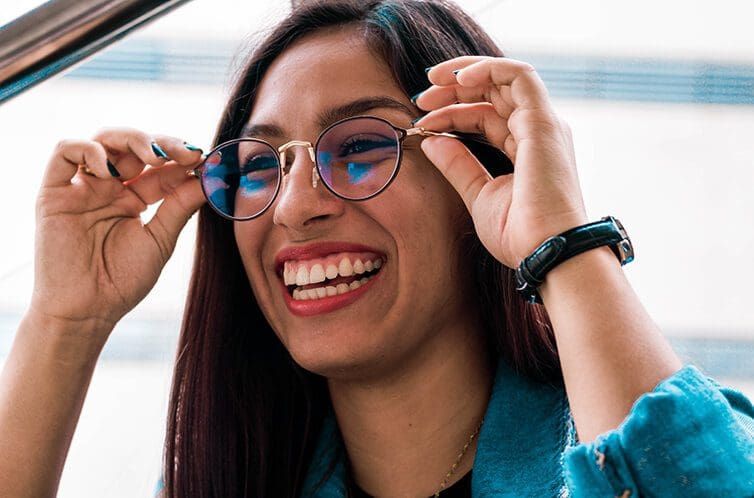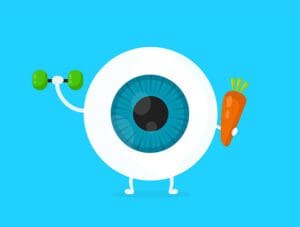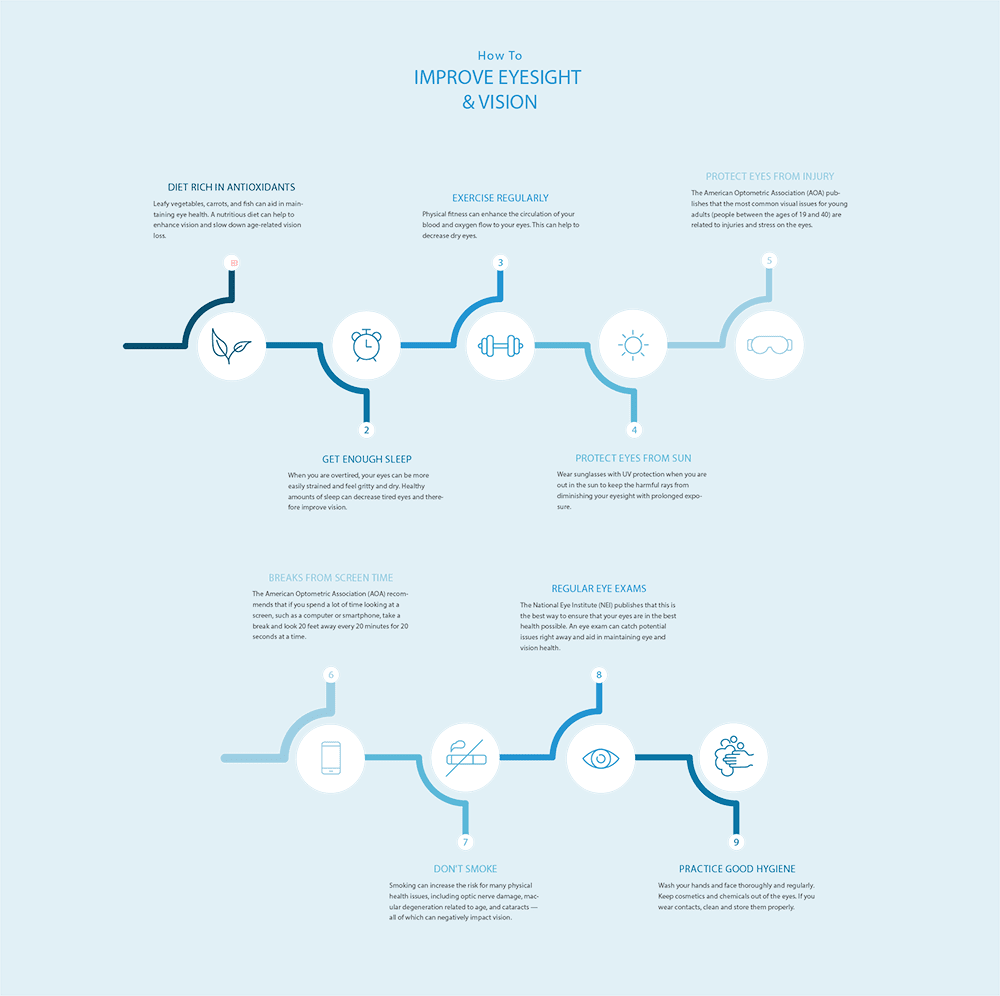How To Get Clear Vision Without Glasses
There are no specific 'natural remedies' that are proven to improve your vision and eyesight without corrective eyewear if you suffer from astigmatism, nearsightedness (myopia), or farsightedness (hyperopia).

There are things you can do to maintain eye health and potentially enhance your vision, however. These include healthy lifestyle choices like eating well, getting enough sleep, exercising regularly, and not smoking. Reducing eye strain and protecting your eyes from exposure to UV and excessive blue light are also good for eye health.
There are many myths out there about ways you can improve your eyesight without glasses, contacts or surgery. These include things like exercises for your eyes, eating a lot of carrots, and trying to train your eyes without glasses. Most of these techniques have not been proven effective.
The best thing you can do for your eyes is make healthy life choices and see your eye doctor for an exam on a regular basis.
Remedies for Naturally Enhancing Vision
 One of the best ways to take care of your eyes is to take care of the rest of your body. Healthy choices with diet, sleep patterns, and exercise, as well as seeing the doctor for regular checkups and practicing good hygiene, can keep your body and your eyes in good shape.
One of the best ways to take care of your eyes is to take care of the rest of your body. Healthy choices with diet, sleep patterns, and exercise, as well as seeing the doctor for regular checkups and practicing good hygiene, can keep your body and your eyes in good shape.
There is no specific method for improving your vision without the use of corrective measures like laser surgery or prescription eyewear if you suffer from hyperopia, astigmatism, or myopia. The shape of your eyes is what determines your level of refractive error, and that cannot change with exercises or eye training.
You may be able to change the way your brain and eyes work together and therefore improve vision in certain situations. For example, children who suffer from "lazy eye", or amblyopia, can use special vision therapy techniques to help their eyes work together the way they should. This does then improve their vision.
There are things you can do naturally to boost your eye health and therefore your vision.
- Eat a balanced and healthy diet rich in antioxidants and vitamin A. Leafy vegetables, carrots, and fish can aid in maintaining eye health. A nutritious diet can help to enhance vision and slow down age-related vision loss.
- Get enough sleep. When you are overtired, your eyes can be more easily strained and feel gritty and dry. Healthy amounts of sleep can decrease tired eyes and therefore improve vision.
- Exercise regularly. Physical fitness can enhance the circulation of your blood and oxygen flow to your eyes. This can help to decrease dry eyes.
- Protect your eyes from the sun. Wear sunglasses with UV protection when you are out in the sun to keep the harmful rays from diminishing your eyesight with prolonged exposure.
- Wear eye protection when doing anything that could potentially lead to eye injury. The American Optometric Association (AOA) publishes that the most common visual issues for young adults (people between the ages of 19 and 40) are related to injuries and stress on the eyes.
- Take breaks from screen time. The American Optometric Association (AOA) recommends that if you spend a lot of time looking at a screen, such as a computer or smartphone, take a break and look 20 feet away every 20 minutes for 20 seconds at a time. This can help to prevent digital eye strain, which can cause eye fatigue, headaches, neck tension, and decreased vision.
- Obtain regular eye exams. The National Eye Institute (NEI) publishes that this is the best way to ensure that your eyes are in the best health possible. An eye exam can catch potential issues right away and aid in maintaining eye and vision health.
- Do not smoke. Smoking can increase the risk for many physical health issues, including optic nerve damage, macular degeneration related to age, and cataracts — all of which can negatively impact vision.
- Practice good hygiene. Wash your hands and face thoroughly and regularly. Keep cosmetics and chemicals out of the eyes. If you wear contacts, clean and store them properly.
Myths Related to Vision Improvement
 There are many methods out there for naturally improving vision, including a host of ways to train your eyes with eye exercises. Some of these methods may work for strengthening your eye muscles or helping your brain and eyes to work better together, but none of them have been scientifically proven to improve vision without the help of corrective lenses or surgery.
There are many methods out there for naturally improving vision, including a host of ways to train your eyes with eye exercises. Some of these methods may work for strengthening your eye muscles or helping your brain and eyes to work better together, but none of them have been scientifically proven to improve vision without the help of corrective lenses or surgery.
- Myth: Eat a lot of carrots. While carrots do contain vitamin A that can aid in enhancing night vision, just eating carrots is not going to make you see better. A balanced diet full of vitamins and nutrients is good for eye health. Just eating a ton of carrots on their own may actually make you sick or appear yellow.
- Myth: Do not wear your glasses because they can make your eyesight worse. Corrective eyewear, such as contact lenses or glasses, is not going to decrease your natural eyesight any more than it is going to "cure" your refractive error, Mayo Clinic explains. Prescription eyewear can help you to see better. Glasses and contacts will not change the shape of your eyes, so they can't impact eyesight when you are not wearing them.
- Myth: Practicing relaxation or eye massage techniques can decrease the need for glasses. Methods like rubbing your palms on your eyes, placing hot and/or cold compresses on your eyes, or using mud packs over closed eyes are often touted as ways to improve vision naturally. These methods may help to reduce eye strain and be a good way to decrease tension, but there is no proof that they can actually improve your eyesight directly.
- Myth: Eye exercises can correct refractive errors and help you see better. There are many eye exercises that claim to train your eyes and the surrounding muscles. Many are extremely tedious and require long periods of concentration every day. They may be helpful in some way, but it is not proven that they work. It is easier to wear prescription eyewear instead.
Improving your vision naturally often comes down to eye health in general. Healthy lifestyle choices and regular eye exams are the optimal method for keeping your eyesight as good as possible for as long as you can.
Talk to your ophthalmologist about specific tips for maintaining and enhancing your vision and eye health.

References
The See Clearly Method and Other Programs: Do Eye Exercises Improve Vision? (May 2014). All About Vision.
How Vision Changes as You Age. (April 2019). All About Vision.
Adult Vision: 19 to 40 Years of Age. (2019). American Optometric Association (AOA).
To Prevent Digital Eye Strain. American Optometric Association (AOA).
Simple Tips for Healthy Eyes. National Eye Institute (NEI).
Myths and Facts. Mayo Clinic.
The information provided on this page should not be used in place of information provided by a doctor or specialist. To learn more, read our Privacy Policy and Editorial Policy pages.
How To Get Clear Vision Without Glasses
Source: https://www.nvisioncenters.com/improve-eyesight/
Posted by: lacoursereupok.blogspot.com

0 Response to "How To Get Clear Vision Without Glasses"
Post a Comment